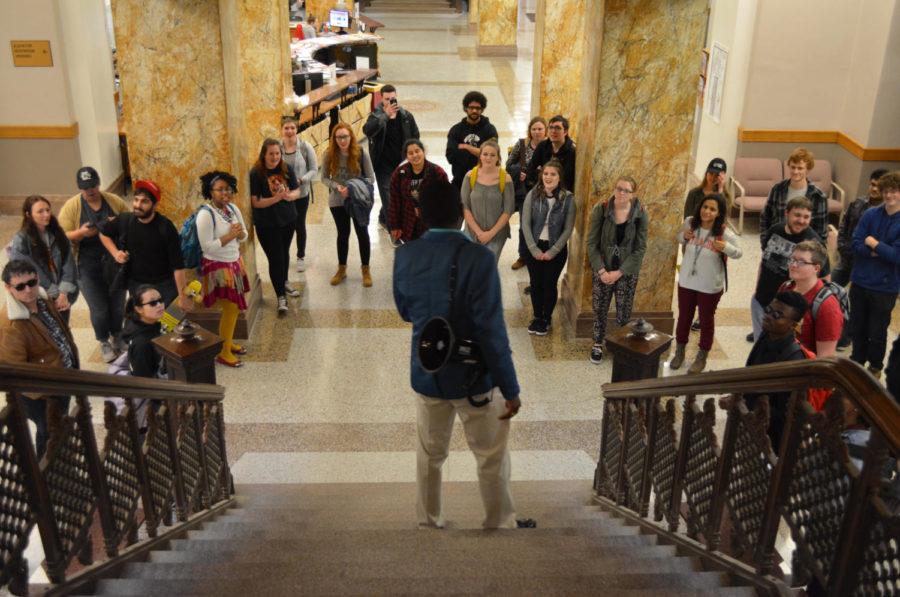Editorial: First Amendment under attack on college campuses
Katlyn Campbell/Iowa State Daily
Dozmen Lee, sophomore in political science, speaks to an audience of protesters in Beardshear Hall on Apr. 7 during a protest against prison labor as a form of modern day slavery. “People should not be held to the standard of working for sparse wages just because they’re incarcerated,” Lee said.
September 24, 2017
Public universities hold the roots of movements and discourse across the nation. Yet, throughout the years and especially today, there are significant attacks on the First Amendment on our campuses.
Recently, the University of Ohio enacted a policy banning demonstrations, sit-ins and speeches inside buildings on its campus, according to the student newspaper, The Post. We wholeheartedly agree with The Post Editorial Board that this is a limitation of free speech.
It is one thing to more clearly define rules of expression, such as keeping volumes at a reasonable level so as not to disrupt classes, but it is entirely different when a complete ban is placed on expression. Many demonstrations on both Ohio University’s and Iowa State’s campuses have been a significant way that students have expressed their opinions — including a march to Beardshear after the 2016 presidential election.
Whether or not we agree with the purpose or style of a demonstration, it should be no barrier to the rights we are granted in the First Amendment to peacefully protest.
It is important that campus administrators recognize the importance of maintaining the First Amendment in its entirety, even when views expressed do not reflect the campus at large. In December, the editorial board wrote that while we strongly disagree with the rhetoric of Milo Yiannopoulos, we felt Iowa State may have been using security fees to limit speech.
“While it is the opinion of this editorial board that Yiannopoulos’ poisonous rhetoric and hate-filled views dilutes public discourse to the point of deterioration, it is his right to say it,” the editorial board wrote. “That said, just because one has the right to say something does not give it value when it comes to civil discussion.”
“If it was the intent of the university to cancel Yiannopoulos’ event through unreasonable security hikes, then that constitutes a direct violation of First Amendment rights. Any alternative, however, seems more like bureaucratic error or a legitimate security concern.”
At the time, there was little discussion about this from the campus at large. Some could speculate this is because Iowa State’s campus is majority liberal-leaning and did not want to fight for a far-right speaker. Imagine the uproar if a far-left speaker hadn’t been allowed to speak on campus. Either way, a public discussion about when and in which ways the university can restrict speech is due.
There seems to be a misconception that you can’t protect radical speech while still trying to create an inclusive campus. Free expression and a welcoming environment don’t have to be mutually exclusive. The solution, while by no means easy, can be simplified to attacking ideas rather than people. If we were able to disagree with each other while still being able to listen to where opposing views come from, it would be much easier to have civil discourse.
The beauty of the First Amendment is that you can both allow controversial rhetoric and speak up against it. If one person says something hateful, one hundred people can say they disagree and add something empowering.
It’s not a limitation of free expression for university officials to speak up against divisiveness when they are not placing any restrictions on such expression. We applaud Senior VP for Student Affairs Martino Harmon for speaking up against white nationalist posters while recognizing that free speech protects the expression of the views in the posters (though defacing property is against policy).
There are those that argue that such hateful speech should be restricted, but that’s actually quite dangerous. If you give the government and its entities the authority to restrict some speech — no matter how much we blatantly disagree with it — where do we draw the line? The government would then be allowed to restrict speech of marginalized groups that are speaking up to voice their concerns.
All of us, no matter where our beliefs fall, have a need for the First Amendment and should fight for it. Often conversations needed for progress are not comfortable ones and if the government had the opportunity to limit some of those discussions, history tells us that they would.







